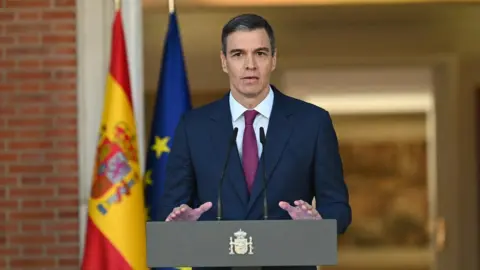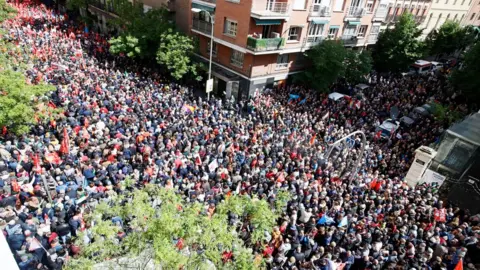Spain's Prime Minister Pedro Sánchez will not resign after allegations against wife
 Reuters
ReutersPedro Sánchez has said he will stay on as Spain's prime minister, following five days of speculation over his future.
Mr Sánchez cancelled official engagements last week after a court opened an initial inquiry into his wife over corruption claims.
He denounced them as a harassment campaign by right-wing media.
"Expressions of solidarity from all sections of society" meant he decided to remain in office, he added.
A series of demonstrations were held around Spain over the weekend, calling for the prime minister to continue in his post. More than 10,000 people gathered in front of the Socialist Party (PSOE)'s headquarters in Madrid in a show of support for the prime minister.
"Thanks to this mobilisation, I have decided to continue leading the presidency," Mr Sánchez said, vowing to carry on "with more strength if possible".
"This isn't about the destiny of one leader - it's about deciding what kind of society we want to be. Our country needs this self-reflection. We have let the mud soil our public life for too long," he said.
The accusations against Mr Sánchez's wife, Begoña Gómez, were brought against her by the organisation Manos Limpias (Clean Hands), led by a man linked to the far-right called Miguel Bernad.
On Thursday, Madrid's public prosecutor called for the probe to be shelved for lack of evidence. Manos Limpias also acknowledged the allegations might be incorrect because they were based on online newspaper stories - one of which has already proven to be false.
In his speech, Mr Sánchez also acknowledged that his statement announcing his decision to take time off to reflect may have been "disconcerting" but said that "there are times when the only way to move forward is to stop, reflect and decide what way we want to go."
Many had expected Mr Sánchez to either resign or to call a confidence motion.
 EPA
EPAMonday's announcement was met with jubilation by the leader's allies.
"Thank you for defending democracy, for championing decency and for fighting for a supportive and courageous Spain," PSOE spokesperson Esther Peña Camarero said on X.
But members of the opposition were less supportive.
Isabel Díaz Ayuso, the opposition Popular Party (PP)'s leader of the Madrid region, accused Mr Sánchez of being "shameless".
She said the prime minister had taken five days to decide "how to attack judges, political rivals and the free press" and added: "He should give fewer speeches without journalists and more press conferences where he can be asked questions."
Conservative Popular Party leader Alberto Núñez Feijóo said that Spain did not have "a president worthy of its name" and that Mr Sánchez had "made a fool of this nation of 48 million Spaniards" with his "feigned resignation".
Santiago Abascal, the leader of far-right opposition party Vox, said that Mr Sánchez's "theatre" had plunged Spain into "international embarrassment of incalculable dimensions".
For his part, Miguel Bernad of Manos Limpias said Mr Sánchez's decision to stay in his post could hurt the PSOE "tremendously" and claimed more evidence would appear that incriminated Mr Sánchez himself. "I believe that in the coming days there may be events that will make him reconsider his position," Mr Bernad said.
Last week, Mr Núñez Feijóo accused the prime minister of creating "a political survival operation" and turning the allegations against his wife and his subsequent response into a show ahead of crucial elections.
Indeed, Mr Sánchez's decision to suspend public duties came at a tense time for his Socialist Party ahead of European Parliament elections in June and elections in the Catalonia region of north-eastern Spain next month.
Pedro Sánchez leads an awkward coalition that includes two Catalan separatist parties, which were persuaded to support the government in return for an amnesty that covered a banned Catalan referendum on secession in 2017.
